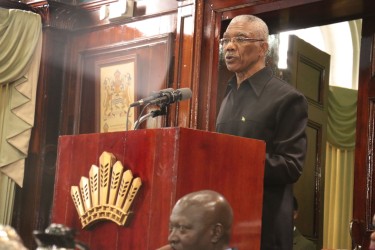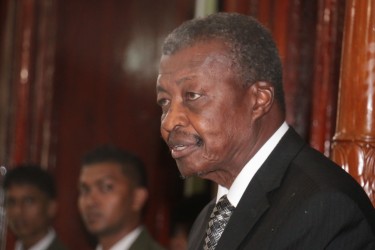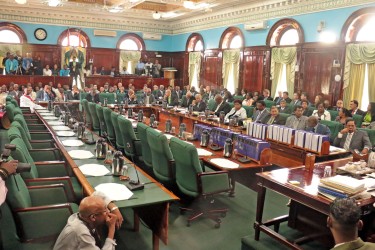Saying that his administration would endeavour to eradicate the enemies of the people, such as crime, disease, ignorance and poverty, President David Granger in his inaugural address to the National Assembly yesterday announced steps the new administration plans to take the country forward.
Among these are the creation of jobs for young people, better education, an increase in police salaries, a moderate increase in public service wages, improving the country’s infrastructure, creating better investment opportunities, tax reforms, autonomy for the Parliament Office and revising the relevant labour legislation. On the legislative agenda are the capping of the benefits in the controversial Former President’s (Benefits and Other Facilities) Act and the Anti-Money-Laundering and Countering the Financing of Terrorism (Amendment) Bill.
Speaking to a packed National Assembly, with only the 32 PPP/C opposition seats empty, President Granger declared the 11th Parliament open by calling for his peers to leave the hostility and rancour of the campaign trail behind them. He called on the PPP/C to join the coalition government in the House to serve the people, reminding them that a month ago, thousands of Guyanese elected them all to craft a collaborative approach to confront the challenges facing the country. The PPP/C is yet to publicly state whether it would be occupying its seats as it maintains that the May 11 polls were rigged and is still calling for a recount of all ballots.

The empty seats mirrored 1997, when the PNC—led by Desmond Hoyte—did not take up its 22 seats for months after Janet Jagan was declared president. What followed those elections were weeks of violent protests and it had taken the intervention of the international community via the Herdmanston Accord and St Lucia Statement, which saw the crafting of an agreement between the two sides and reduced Janet Jagan’s presidency to three years. She had subsequently cut it even shorter by naming Bharrat Jagdeo—who was then minister of finance—to complete her tenure.
“This is the time for collaboration, not confrontation. This is the place—the halls of the National Assembly—where we will conduct the great debate on Guyana’s future,” the President said.
As has become the norm, the President arrived to loud applause from the hundreds lining the street outside and seated under tents thrown up in the newly reopened People’s Park.
As he almost sprang out of the car and briskly made his way to dais, taking long strides and outpacing Prime Minister Moses Nagmootoo and others walking beside him, the crowd cheered with many also occupying the buildings around in an effort to get a glimpse.

With the surroundings and the compound of Public Buildings sparkling from the recent clean up exercise that has gripped the nation, Granger took the salute before inspecting the Guard of Honour. His erect back and precise steps, an advantage of his military background, brought more cheers and many on the Parliament corridors were heard commenting on this.
Dressed in what might now be described as his trademark black suit, Granger was escorted by the heads of the disciplined forces and his arrival was greeted by a rendition by the police band.
Introduced by newly elected Speaker Dr Barton Scotland, the President then moved to the rostrum set up for this purpose and began his just over half-an-hour speech, which included two jokes, but while others laughed he did not even crack a smile.
The President pointed out that the National Assembly had not met for 11 months – since July 2014. “This is a consequence of a combination of the recess, prorogation and dissolution. No democracy should tolerate such perversity,” he said.

Joking that he had lost his seat as Leader of the Opposition, he said he was not standing there as leader of a partnership or coalition but of the entire nation and of an administration that is committed to doing the greatest good for all Guyanese.
‘One nation’ policy
Saying that his government is guided by a ‘one nation’ policy, Granger said it envisages the elimination of one-party domination of the government; enhancement of local, municipal and parliamentary democracy; elimination of ethnic insecurity; expansion of economic enterprise; enrichment of cultural life and deepening of national consciousness.
“Your government seeks first and foremost to eliminate extreme poverty. Our Poverty Reduction Plan will adopt a ‘one nation’ approach, reducing inequalities, removing obstacles to education, opening opportunities to the disadvantaged and uniting coastland and hinterland. We shall introduce social policies that will harness and develop the creative energies of our people and that will support the holistic development of our women and youth,” the Head of State said.
He said government is aware that too many young and old people are classified as ‘extremely poor’ but that poverty can be eradicated with good governance and the sensible public policies which shall be introduced.
However, he warned that the fight against poverty cannot be won through handouts or trickle-down economics but rather through providing jobs, which would be one of his government’s priorities.
“Many of our young people are leaving school and university but are unable to find jobs. Without jobs they cannot escape from the cycle of poverty,” the President stated.
Measures to establish young people’s economic independence and to improve their livelihood by promoting micro-enterprise development would continue to be introduced. A war against poverty would be waged, the President said but through an inclusionary process that would boost national confidence and allow for the mobilization of the material and human resources needed. He also announced that in conjunction with the private sector, a forum will be organized that will bring together businesses, trade unions, political parties and civil society. This forum would see the development of a social contract that will guide the economy for the next five years.
Further, Granger announced that his government would implement measures to institute inclusionary democracy and social cohesion in every municipality, neighbourhood, region and in the National Assembly.
And in stating that his government would revise the relevant labour legislation to support all legally constituted and functioning trade unions, Granger said it would give effect to the Motion passed in the 10th Parliament to restore the annual subvention to the Critchlow Labour College.
Last year the Guyana Trades Union Congress had rejected the terms for the restoration of the subvention to the college which had been cut by the previous administration nine years ago following accountability concerns. The major bone of contention for the GUTC was the then government’s proposal for rival body, the Federation of Independent Trade Unions of Guyana (FITUG) to have the same number of members as the GTUC on the college’s board. It had argued that government could not dictate who should sit on the board of the private institution.
Equitable access
Granger also announced his government’s plan to ensure equitable access of all Guyanese to good health care, arguing that the primary health care system is failing women, children and the aged. The empowering of womenfolk is also on the agenda and building a country in which women and girl children can expect to live in safety and be protected from abuse and violent crime.
Economic stability will be of paramount importance and this will include the crafting of a long-term national economic strategy. Amendments to appropriate laws to reform taxation would be introduced and this would include value-added tax, income tax concessions to wage earners and offering fiscal incentives on an equitable basis to all investors.
The government would also place the important diamond and gold-mining industry on a sound and stable basis with the establishment of a Sovereign Wealth Fund, derived from revenues from the forests, mines, waters, lands and other natural resources to benefit future generations.
One of the big promises by the coalition on the campaign trail was the creation of jobs and Granger yesterday said his government would introduce measures to provide more people with job security. Also there are plans to intensify education in the sciences, technology, engineering, mining, agro-processing and the arts to expand employment and promote economic growth.
“Your government will ensure that as a general rule, people who are paid only the national minimum wage will not be required to pay income tax. We shall ensure, also, that there will be no increases in income tax rates, value-added tax or national insurance contributions for this financial year [FY 2015],” the President said.
He announced that there will be moderate increases in salaries paid to public servants and in pensions. These were included in the coalition’s list of things to do in the first 100 days in office.
According to the President, measures would be introduced to curb the rate at which so many primary school children are failing to qualify to enter secondary school or are dropping out of primary and secondary school every year.
Autonomy
To desk thumping from MPs, Granger announced his government’s intention to ensure that the National Assembly is granted administrative, institutional, political, and financial autonomy. To this end the government would ensure that the 11th Parliament is equipped with its own budget office and its own Parliamentary Counsel based right at Parliament. The Office of the Clerk of the National Assembly Bill would be introduced to establish an independent office of the Clerk of the National Assembly that would allow greater independence in the appointment of all staff of the Parliament Office.
Also on the legislative agenda, the President said government would introduce a Constitution (Amendment) Bill, to amend the constitution to add certain entities, such as the service commissions and the Guyana Elections Commission that ought to enjoy financial autonomy as constitutional bodies. The Fiscal Management and Accountability (Amendment) Bill, and the Constitutional Offices Commission Bill would also be introduced.
Prefacing with “Hear this”—much to the amusement of those listening keenly—the President said the Former Presidents (Benefits and Other Facilities) Bill would be introduced to cap benefits, including tax-free concessions and to specify some conditions under which the benefits are to be enjoyed.
The long awaited Telecommunications Bill would be tabled along with the Public Utilities Commission (Amendment) Bill, the Broadcasting (Amendment) Bill and the Local Government (Amendment) Bill to allow the setting of the date of local government elections, which were last held in 1994.
Also, Granger said government would do everything in its power to secure the country’s borders, to build and strengthen relations with its neighbours and continue to work towards the adherence to agreements that respect the country’s territorial integrity.
Importantly, measures would be introduced to reform the defence and security sectors to ensure that the country’s defence and police forces protect citizens and the territory, allowing Guyana to feel safe.
“Your government will refashion the Guyana Police Force into a more professional and better equipped law-enforcement agency. We shall pay policemen and women better so that they are not easily led into temptation,” Granger said.
“We shall reduce other everyday crimes – including banditry, murder, piracy, fatalities on the roads and interpersonal violence that are scaring foreign investors, driving away the educated élite, stifling the manufacturing sector, strangling local enterprise, scuttling the economy, undermining economic growth and impeding social development,” he promised
He ended his speech by praying that the National Assembly will debate, deliberate and determine the matters that will be brought before them without cowardice or malice.
The next sitting of the National Assembly would be on June 25.





